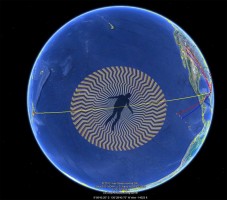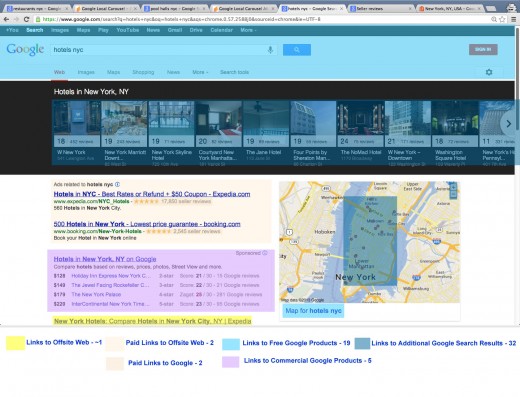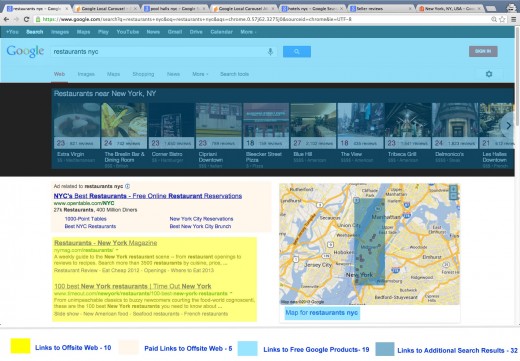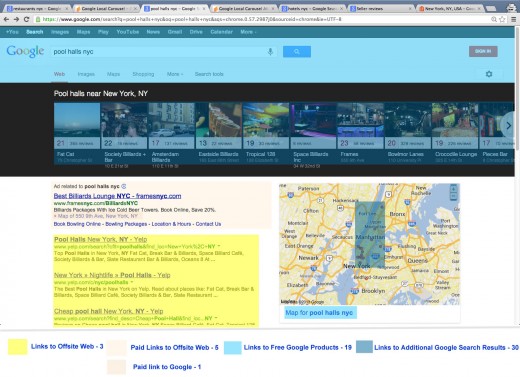Understanding Google My Business & Local Search
Google’s Local Carousel – Trapped in Google’s World?
 The new Local Carousel is certainly going to change user behaviors. Exactly how is still to be determined. To some extent whether ads do better or organic does better depends on what users see in any given “industry + geo” search. It also depends on how they respond to the (thinly?) populated knowledge panels or whether they move on to a well branded and respected site like Yelp or Tripadvisor to get their answer. I think though after analyzing these displays the answer as to what is really going on is somewhat more obtuse and well… self serving.
The new Local Carousel is certainly going to change user behaviors. Exactly how is still to be determined. To some extent whether ads do better or organic does better depends on what users see in any given “industry + geo” search. It also depends on how they respond to the (thinly?) populated knowledge panels or whether they move on to a well branded and respected site like Yelp or Tripadvisor to get their answer. I think though after analyzing these displays the answer as to what is really going on is somewhat more obtuse and well… self serving.
One thing is for sure, the geography above the fold is radically changed. Besides the Local Carousel, over the past year Google has been making a number of changes to the main search page that include the additional menus (2x), the bright red sign in button and the grey bar. I think we need to assess the Local Carousel in view of all of the changes on the main search page. I wanted to look at a “typical” desktop screen and understand exactly what was visible to searchers above the fold in this new context.
To analyze these searches I took screen shots of a full screen on a 1440 x 900 pixel display. I removed as much extraneous material from my screen as possible to give Google the benefit of the doubt in this analysis. I removed the dock, used Google Chrome, turned off any additional features that would take up screen real estate and entered full screen mode. Somewhere on the order of ~54% of desktop users see this much or less vertical and horizontal space when they view Google local carousel result.
In addition to the Local Carousel for Hotels NYC I looked at displays for Restaurants NYC and Pool Halls NYC in an effort to get a range of ads, organic content and different Google insertions. I then counted how many visible links there were and where they pointed. I highlighted the areas that corresponded to each link type.
Hotels NYC (click to view larger):

For the purposes of analysis I grouped the links as follows and noted the results at the bottom of each screen grab. For the hotels here are the numbers listed out:
Paid Links Pointing Offsite – 7
Paid Links Pointing Onsite to other Google products – 2
Links to Additional Google Search Results (this includes Carousel images and pins on the Map) – 30
Links to Other Free Google Products Incl Menus & Maps – 19
Links to Other Sponsored Google Products – 5
Links to Offsite (off Google) Websites – 1
The hotel industry is slightly unique given Google’s Hotel Finder product but searches in other areas show similar results that only varied slightly in terms of links pointing offsite.
Restaurants NYC (click to view larger):

Pool Halls NYC (click to view larger):

Certainly there are winners and losers amongst the businesses that are shown (or not) in the new results. The knowledge graph data about any given business is very thin and to get to that, as Linda Buquet and Greg Gifford have pointed out, requires at least one more click to get to basic information. Perhaps that might be offset by the increase of businesses now visible in the carousel, the horizontal orientation leading to less “fall off”, a potential increase in “forced” branded searches upon the click of an image and the fact that the Carousel is much higher on the page than the 7-Pack. Time will tell. On some searches high ranking name brand sites like Yelp and Tripadvisor seem to have gained an advantage and on others fewer adwords seem to display.
But when you compare these screen shots to David Mihm’s analysis of a similar search result from last year at this time the biggest change is not that there is more monetization of clicks but that many of the clicks opportunities now take the user back to Google search results or Google properties rather than offsite. This is true of both paid and non paid results.
This chart summarizes all links above the fold and where they point. To me this is the story of the Local Carousel:
| Search | Total Paid & Free Links Pointing Offsite | Total Paid & Free Links Pointing to a Google Property |
| Hotels | 8 | 64 |
| Restaurants | 11 | 60 |
| Pool Halls | 8 | 56 |
It is arguable whether the searcher and the businesses benefit from this arrangement. It is not arguable whether Google does. As David noted last year “it really is a Google World and we are all just living in it”. This year Google seems to have doubled down on its own reality so it has, perhaps, become even more so. And the searcher might never be able to escape.
© Copyright 2025 - MIKE BLUMENTHAL, ALL RIGHT RESERVED.
Comments
21 Comments
Excellent analysis, Mike, as always.
I noticed this the other day, and wondered if it was just a test. Your article confirms it is much more than a test.
It not only indicates ways searchers will have to decide if this is the way they want their results (as you discuss above), but also the importance for businesses of making sure their G+ local listings are complete, attractive, and current!
@Scott
Thanks
And it should clue businesses into the importance of the fact that the future is very well adwords (at least) on their and their competitor brands.
Mike:
Per email I had pointed out to you about the change google made with image search in late January this year.
The change involved taking a person who clicked on an image to a google page rather than to the page on the url where the image was located.
People with heavy image sites screamed bloody murder. It killed their traffic. People who had adsense on those pages got crushed.
The traffic went to a google page.
One of our local sites has an image ranked #1 in image for a one word search. It was an anomaly and didn’t impact our business but it killed the image traffic. Drove it to a trickle from previous experiences.
Users went from our image to the Google world.
YUP they stole our traffic.
So if these carousels are taking people into the google world and away from content its not good for the sites, the smb’s the local businesses.
Its going to be good for google though. Of that I’m sure.
BTW: I participate in a local foodie forum in my region. Its small potatos compared to overall traffic but the folks there while disdaining yelp for the many inane comments tend to use yelp. It seems they use yelp more than google search for restaurants.
Of the few who commented about the carousel search for restaurants—-They hated it.
They want simple access to restaurants by type, by neighborhood or community. They want menus, hours, info on reservations, and other relevant info.
They want a rating system that provides simple methods of evaluation along with reviews….
Google is an enormous monopoly. At some point down the line one of the many hits that its competitors are trying to impose on them will stick with the government and some serious penalties or changes will be imposed.
As to impacts…when I do hotel searches there are lots of ads. When I do restaurant searches I see few ads.
If I start seeing a world of ads for restaurant searches we’ll have strong evidence on who benefitted from this carousel change.
Great point of view Mike! I had yet to consider the fact that the Carousel pushes organic content further down the page, giving paid and owned content more prominence.
Yes, above the fold is a Google World… and it’s not by accident either. Thanks for highlighting this Mike
Thanks for sharing this analysis, Mike. I am still finding Google wearing black a jarring experience (don’t think black is Google’s color), and I expect many others are, too, but having analysis of this kind helps me to get past the feeling of surprise to seeing what is really going on with these big changes. So appreciate your generous insight.
Hey Mike,
Quick question. On the Carousel in your examples, some of the review scores are red and some are black. When you click on the red ones they say the review score is “Zagat” and when you click the black score in the carousel it only shows the word “score” next to their review score. I thought they were all Zagat scores now? What am I missing?
@Dave
The business has to have at least 10 reviews to get the Zagat lablel.
Hey Mike,
Thanks for providing insight into the relentless pace of updates to blended results on the frontend. Being in Canada, I usually have to wait awhile for the changes to roll out here.
Do you have any idea what the scope will be for displaying carousel listings? Has Google stated anywhere or mentioned to you what categories will/could be included beyond restaurants/hotels and the like? Could this turn into a portrait gallery if attorneys, medical practitioners and other professional local services trigger the carousel?
At the rollout, Google noted that it would show on local dining, nightlife, hotels, and other attractions. We have also seen them show in a range of recreational, leisure and entertainment categories like golf, bowling alleys, movie theaters, night life, ballrooms, sing lessons, art galleries and gas stations. Gas stations? Yes certainly an outlier in the travel and leisure themes.
Mike, I used to think 10 reviews was what it was but it doesn’t hold true in your Pool hall nyc example. I thought maybe they moved the number up since on that search the smallest number of reviews to have the zagat tag was 70 but it didn’t hold true on a search for Pool halls Chicago. On the Chicago (wide monitor) search you have one company in position 8 with 23 reviews with a score of 23 get a zagat tag, while the company next to it in position 9 with 25 reviews and a score of 25 not get a zagat tag? So I think something has changed. I’m not so concerned about the zagat label, but differentiating with the red is kinda cool.
@Dave
Ah sorry. That means that someone from Zagat actually visited and did a “pro review” and that the place was rated in the Zagat guide in addition to the Google reviews.
Can someone summarize for me why Google vastly driving up the quantity of Google-inbound links is good for their bottom line? Is it about having better quality and more quantity of customer data to sell in to DMPs, etc? Knowing that they live and die by ad revenue (today) and are now willing to insulate customers from leaving the Google-verse has me stymied. If it’s obvious, feel free to flame away!
Awesome breakdown! Love the ending too, for all their talk about focusing on the user, they sure seems to be focused on users using more Google products.
@Jeremy
I assume that they think that consumers will prefer Google’s content over the broader internet’s content and in doing so will get to see more relevant ads… but its hard to really know the thinking isn’t it?
@Kyle
thanks
Mike:
This is a comment based on intuition and not hard study. Its spurred a bit by this recent consumer survey just published with regard to the habits of people searching for local smbs: http://www.brightlocal.com/2013/06/25/local-consumer-review-survey-2013/
Restaurant searches are the dominant category for local businesses and hotels are a significant category.
Both of course are prominent elements for the Carousel.
I don’t SEO for either restaurants or Hotels. I do interact with restaurant operators a lot and have recently spent a fair amount of time discussing internet issues. My conversations have been confined to the DC region.
I’d add that in that context, one site that is available to greater or lessor degree around the nation is OpenTable the Restaurant reservation site that also encourages, incentivises and ultimately carries many restaurant reviews. OpenTable is VERY strong in the DC region. It might have the greatest penetration of restaurants within DC. At the least it is one of OpenTable’s dominant markets at least in terms of penetration of the market.
I reference this in the context that my opinion and perspective from discussing internet issues with restaurateurs is that they have noticed in a certain context that access to their restaurants comes from many sources. One big finding was that Yelp is no longer the big brutish monkey that dominates access to restaurants..yet it is still there.
On an overall volume of reviews for restaurants, again and again I often see a roughly equal volume of reviews between google +, yelp and OpenTable (when the restaurant uses OpenTable).
People are searching through google. yes. But they are also using other sources. They are using apps for yelp, opentable and other apps. Some of the GPS navigation apps have great information about local businesses.
There already are a lot of ads with regard to hotel sites, on top of which there is google’s hotel finder tool. For restaurants I see fewer ads, and certainly less that reflect specific restaurants.
Based on your data above with regard to links above the fold for the different categories..Google has dramatically expanded its visibility for both ads and google products/pages/information.
I’m wondering if some of this is simply to redirect traffic for restaurants to Google products, with or without ads. The monetization effort for ads on restaurants might come later if the traffic grows.
Maybe google is losing some of that restaurant traffic. Per the brightlocal research it really dominates with regard to searches for local businesses. And lets be frank…a lot of local search categories are sort of small volume searches in their own regards.
So while ads might be foremost on our minds…is it possible that google is thinking a bit longer term and trying to get ever more of that restaurant traffic without directly and immediately monetizing it now.
I don’t know, but I wanted to throw that out.
(the voluble one–among others)
@Dave
I’m wondering if some of this is simply to redirect traffic for restaurants to Google products, with or without ads. The monetization effort for ads on restaurants might come later if the traffic grows.
As I noted above “the biggest change is not that there is more monetization of clicks but that many of the clicks opportunities now take the user back to Google search results or Google properties rather than offsite. This is true of both paid and non paid results”.
Given the way that Google has structured each click then they are getting many more shots at any given searcher. So yes, there is at least equal opportunity now and increasing opportunity as consumers habituate to a 100% Google diet.
Mike:
Yes you did say that. I wanted to reiterate it. I generally see far fewer ads in google in the restaurant vertical than in the hotel vertical. I expect there will be different click through trends with the carousel.
Google already has a large data base on user reactions from its months of carrying this UI on tablets. We are the one’s in the dark.
I got a feeling from my interactions with restaurateurs that google search is not as overwhelmingly a source for leads as in some other verticals.
but I suppose we’ll get better data on all this as we move along.
Thank you Mike for your insightful analysis. The eight hundred pound gorilla is exerting it’s influence once again. It’s obvious Google wants more attention of it’s users and who are we to stop them. It’s Google’s search engine and if businesses want to benefit, they have to play by Google’s rules. My advise to small business owners is; if you want to benefit from online search, you need to utilize and optimize anything you can get your hands on that Google owns and allows you to access. I don’t coach them to be exclusively on Google. I want them to cast a wide net, but it just so happens that Google owns a lot of the strings that control that net.
I wonder if Google is getting too big for its britches which will result in a growing number of holes in its pants – as in, forcing searchers and even businesses into a Google circular trap will result in more people using and eventually catering to alternative search engines. My issue with this new carousel is that you are finitely limited on the number of results you get. I get 20 on my screen. For a small market with limited results, this is great; suddenly visibility has increased magnificently, for searchers, for anyone showing on the carousel. But for a large metropolitan market, there are suddenly hundreds of businesses that are getting no representation. Of course, if the algorithm is the same, those businesses weren’t really showing anyway, but somehow there seems to be a more concrete distinction between showing up buried in the old non carousel serps and not showing up at all in the carousel results.
Great article Mike.
I noticed Google a couple months ago playing around with this in search results for a couple days and seemed to pull back and now they pushed it out fully.
Funny how you were capturing results with ads, I wasn’t finding any when it was pushed out.
Comments for this post are closed.